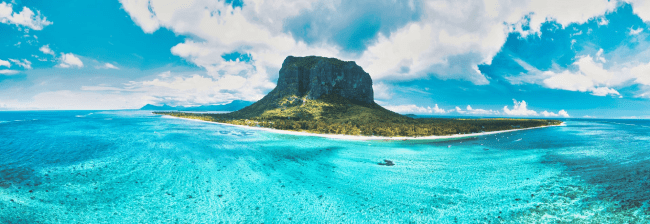
Mauritius
Welcome to Mauritius
Traveling to Mauritius? You may need a visa – find out if you do, which type, and how to apply so you can get the paperwork out of the way and focus on your trip.

What’s a Mauritius Travel Digital Form and who’s it for?
Who’s the Mauritius Travel Digital Form for?
The Travel Digital Form is mandatory for all foreign travelers to go through the immigration/entry process in Mauritius.
What’s the purpose of a Mauritius Travel Digital Form? It collects contact details, travel history, and accommodation details of travelers in case of emergencies or other occurrences.
How long can you stay with a Mauritius Travel Digital Form?
The digital form is a single-entry document, which means it's only valid upon entry to Mauritius. Whenever you travel to Mauritius, you must apply for a new one.
What’s a Mauritius Visa on Arrival and who’s it for?
Who’s the Mauritius Visa on Arrival for?
-
Those who don’t hold a passport from any of the visa-exempt countries. Check your visa requirements through our handy tool.
-
Those who don’t need a traditional visa before they arrive in Mauritius.
What’s the purpose of a Mauritius Visa on Arrival? Tourism.
How long can you stay with a Mauritius Visa on Arrival? The Visa on Arrival allows a maximum stay of 60 days for most nationalities.
What’s a Mauritius Visa and who’s it for?

Who’s the Mauritius Visa for?
Citizens of the following 16 countries and territories must obtain a visa in advance from one of the Mauritian Embassies or Consulates near them:
-
Afghanistan
-
Bangladesh
-
Guyana
-
Iraq
-
Kosovo
-
Libya
-
Laos
-
Mali
-
North Korea
-
Pakistan
-
Palestine
-
Somalia
-
South Sudan
-
Sudan
-
Syria
-
Yemen
Who isn’t eligible for a Mauritius Visa?
Those who can get a Visa on Arrival or are visa-exempt for Mauritius.
What’s the purpose of a Mauritius Visa? Tourism.
How long can you stay with a Mauritius Visa?
The validity and total max. stay depends on your nationality and travel purpose.
At iVisa, we currently don’t offer the Mauritius Visa, but you can find out more on the government website.
What’s a Mauritius Premium Visa and who’s it for?
Who’s the Mauritius Premium Visa for?
Tourists, retired people, and professionals.
Who isn’t eligible for a Mauritius Premium Visa?
You can’t apply for this visa if:
-
You want to find a job in Mauritius.
-
Mauritius is the main source of your business, income, and profits.
-
You don’t have evidence to support your purpose of travel, such as booked accommodation and other basic immigration requirements.
What’s the purpose of a Mauritius Premium Visa?
Stay long-term and work remotely in this stunning country.
How long can you stay with a Mauritius Premium Visa? The Premium Visa allows a stay in Mauritius for one year and is renewable.
At iVisa, we currently don’t offer the Mauritius Premium Visa, but you can find out more on the government website.
What are the Mauritius long-term visa options?

Mauritius offers several long-term visa options for various purposes, such as residence. Here are some of the common long-term visas:
-
Student Visa: Tailored for international students, this visa facilitates educational pursuits in Mauritius, allowing learners from across the globe to study at the island's esteemed institutions.
-
Temporary Work Visa: Designed for individuals seeking temporary employment in Mauritius.
-
Spouse/Partner Visa: This visa category is for spouses or partners wishing to join their significant others in Mauritius, where the latter must be either a resident or a citizen of Mauritius.
-
Business Visa: Aimed at business professionals, this visa supports those intending to engage in business activities or explore business opportunities within Mauritius.
-
Marriage Visa: Reserved for couples planning to celebrate their union in Mauritius, this visa is granted based on a proven relationship with a Mauritian citizen or resident.
At iVisa, we currently don’t offer these visas, but you can find out more on the Mauritian government website.
Staying healthy in Mauritius: Here’s what you need to know
Mauritius prides itself on having a well-developed healthcare system. Here's what travelers should know.
Make sure to stay updated on routine vaccines
-
Travelers are advised to be current on routine vaccinations such as measles-mumps-rubella (MMR), diphtheria-tetanus-pertussis, varicella (chickenpox), polio, and your yearly flu shot.
-
Depending on your travel plans, vaccinations for hepatitis A, hepatitis B, typhoid, and rabies may be recommended.
-
Keep updated with Mauritius's COVID-19 requirements, such as quarantine, testing, or vaccine certificates, through your airline or the Mauritius government website.
Medical facilities
-
You can find hospitals and clinics equipped with modern facilities, especially in urban areas and major cities.
-
While public healthcare is available to all, visitors might prefer private medical facilities for faster service and more comfortable amenities. However, this comes at a higher cost.
-
Pharmacies are widely available, and most common medications can be purchased over the counter. It’s advisable to carry a prescription for any specialized medication you might need during your stay.
Health insurance
We’d always recommend taking out health insurance before you travel anywhere from any destination.
Contact your insurance provider before traveling to make sure you have the right level of coverage.
Other things to consider:
-
Trip cancellation, delay, and interruption benefits.
-
Medical expenses and medical evacuation benefits.
-
Baggage coverage.
Things to be aware of when visiting Mauritius
Keep an extra eye on the following to keep healthy and safe during your trip to Mauritius:
1. Dengue fever: This mosquito-borne disease is present in Mauritius. There's no vaccine available for travelers, so the best prevention is to avoid mosquito bites by using repellent and wearing protective clothing.
2. Water safety: Tap water is generally safe to drink in urban areas, but it’s advisable to drink bottled or filtered water in remote areas.
3. Sun protection: Mauritius has a tropical climate. Protect yourself from the sun's harmful rays by using sunscreen, wearing hats, and staying hydrated.
Medication for personal use
Follow these tips to bring into Mauritius some over-the-counter medicines:
-
Declare all medications: Report all medication for personal use to customs authorities.
-
Original packaging: Always keep medicines in their original containers and in transparent bags in your hand luggage.
-
Prescription or doctor's letter: Present the medical prescription issued by your doctor or other competent authority, in English.
-
Check for restrictions: Call Mauritius's embassy to verify that all of your prescriptions are legal to bring with you.
-
Quantity aligned with itinerary: Bring only a reasonable quantity that aligns with the duration of your stay to avoid complications.

Related Articles


 Australia ETA Online
Australia ETA Online
 United Kingdom ETA
United Kingdom ETA
 India Tourist eVisa
India Tourist eVisa
 Canada ETA Visa
Canada ETA Visa
 Turkey eVisa
Turkey eVisa
 Egypt eVisa
Egypt eVisa
 Singapore SG Arrival Card
Singapore SG Arrival Card
 Indonesia eVoa Visa
Indonesia eVoa Visa
 Aruba ED Card
Aruba ED Card
